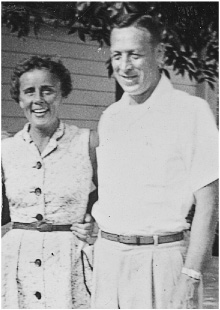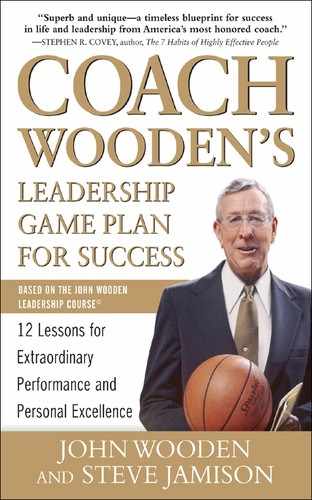PREFACE
BY STEVE JAMISON
Coach Wooden’s Leadership Game Plan for Success is a response to the great interest in and acceptance by the business community and academic world of two earlier publications: Wooden on Leadership (McGraw-Hill) and The Essential Wooden (McGraw-Hill). Those bestsellers introduced John Wooden’s leadership concepts to a new and large corporate audience in America. Here we extend his teaching on leadership and offer a commonsense approach to understanding and incorporating his concepts.
The great coach, now 98 years old, reminds us that when it comes to leadership, teaching, and coaching there is no one right way, or “only way,” but many ways. He offers his own lessons from his own experience with that in mind as well as the hope that you’ll find some observations and directions that lend themselves to bringing out your best as a leader.
In large part John Wooden is self-taught. When he was coming up as a young man, there were no graduate courses in leadership, no gurus of management, no large section at the bookstore titled “Leadership and Management.” You basically had to figure it out for yourself. And he did.
I believe to a large degree this still holds true. You have to pay attention to what’s going on; you have to be a good listener and learner. As you’ll see here, John Wooden was an astute listener and a voracious learner.
In the process he became an historic leader.
Just as John Wooden took the words and deeds of his father and mentors in new directions with creative applications, he hopes you will do the same with his body of teaching.
We’ve included questions that call for reflection and the creation of some straightforward steps on your part, but that’s just to prime your pump. The real evaluation, introspection, and application of this book’s substance in your leadership is up to you. The most important questions, the most valuable tasks you design as derived from Coach Wooden’s philosophy and methodology will come from you.
For many years many people thought of John Wooden as a teacher of basketball only. Since he stepped away from active coaching following UCLA’s tenth national championship, his ideas and example have become increasingly revered and taught by others outside of sports.
Most recently UCLA’s Anderson School of Management established the John Wooden Global Leadership Program to promulgate his leadership philosophy—character-based—in its graduate program.
To paraphrase Ben Jonson’s description of William Shakespeare (one of Coach Wooden’s favorites), I would suggest the following: “The leadership concepts of John Wooden are not for an age, but for all time.” And, in the eyes of many, including me, Coach Wooden is an all-time great leader.

